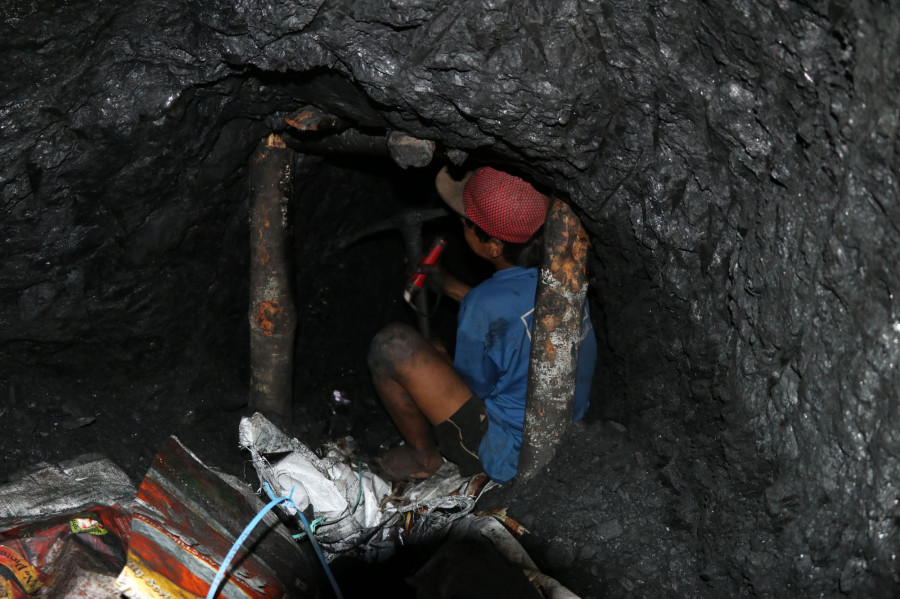Global coal shortage could hit Nepal too, manufacturers say
[ad_1]
India is on the brink of an unprecedented energy crisis as its coal stocks, which power more than half of the country’s 135 coal-fired power plants, are at a critical level. The coal shortage in India, where 70% of electricity is produced using coal, has become a major cause for concern as it threatens to derail the post-pandemic economic recovery.
The repercussions of the global coal shortage are also expected to be felt in Nepal.

This could deal a blow to Nepalese manufacturers – mainly cement, iron, steel and brick factories – who rely heavily on coal for production. Manufacturers say prices for building materials could skyrocket during peak construction season, which could impact the country’s development plans.


Mid-September to mid-December is the main season where most construction activity takes place due to the weather factor – the monsoon ends and fall sets in.
“If the severe shortage persists for weeks, many factories could close,†said Dhurba Raj Thapa, president of the Nepal Cement Manufacturers Association.
According to him, the price of coal has already crossed $ 200 per tonne in a few months against $ 70 per tonne. It is almost three times higher.
“The cost of production will increase accordingly,†Thapa said.
“If the shortage persists, we have to close the cement factories,†he said. “Nepalese cement factories currently have a stock of coal that can last up to a month and a half.
According to the association, there are 64 active cement factories in the country. Among them, 21 factories also produce clinker. The coal crisis could jeopardize the cement industry in Nepal, putting the jobs of around 10,000 people at risk.
Thapa said that the clinker production plants will be automatically closed with the coal shortage and without clinker, cement production is not possible. The shortage in India means it will not export clinkers to Nepal either, according to the manufacturers.
The price of cement is expected to increase by at least Rs 100 per bag, Thapa said.
A bag of cement, weighing 50 kg, costs between Rs550-650.
According to Thapa, the country mainly meets all of its coal demand with imports from Australia and South Africa, followed by India.
According to Indian media, the main reasons for the shortage of supply in India are the below normal build-up of stocks by thermal power plants during the period April-June and the continuous rainfall in the coal areas in August and September. resulting in lower production and shipments of coal from the mines.
The state-owned Coal India, which produces more than 80% of India’s coal, said that an increase in global coal prices and transportation costs had led to a reduction in electricity production by power plants using carbon. imported coal, adding to the pressure on utilities using domestically mined coal to ramp up the output.
In addition, the sharp increase in demand for electricity with the economic recovery from the coronavirus pandemic has affected supply, leading to coal shortages around the world.
Coal accounts for over 70 percent of India’s electricity production and utilities account for about 75 percent of India’s coal consumption.
India is the second largest producer of coal in the world after China and also one of the largest consumers.
Benchmark coal prices in Asia have reached record highs in recent times, supported by global demand for fuels for power generation as economies open up. A major energy crisis in China is the latest event driving global fuel demand.
The brick makers are too worried.
With the end of the four-month long monsoon season and the decline in Covid-19 cases, brick producers expected a recovery after the festivals.
But the global coal shortage has been a huge setback for the country’s brick industry which relies entirely on imported coal.
Mahendra Bahadur Chitrakar, chairman of the Nepal Brick Industries Federation, said stocks of coal were collapsing at most brickyards amid a peak production season.
“I don’t know how to run the factory after Tihar. I don’t have any coal in stock, â€Chitrakar, owner of the Uma Maheshwar Brick Factory in Chandragiri, Kathmandu, told the Post. “If the coal supply doesn’t improve, we have to shut down. “
The brick factories are entirely dependent on imported coal from India. Chitrakar said it will be very expensive to produce bricks using electricity.
There are approximately 1,250 brick factories in the country which directly employ approximately 350,000 people, who are now on the verge of losing their jobs.
The impact of the coal shortage is less visible on steel plants because they use electric arc furnaces.
Kiran Prakash Saakha, senior vice president of the Nepal Steel Rolling Mill Association, said the global coal shortage will not have a “serious impact” on steel plants, as most of them use electric arc furnaces.
The importation of coal is enormous in Nepal.
According to the Nepal Rastra Bank, the country imported coal worth Rs 27.19 billion in fiscal year 2020-21.
[ad_2]

